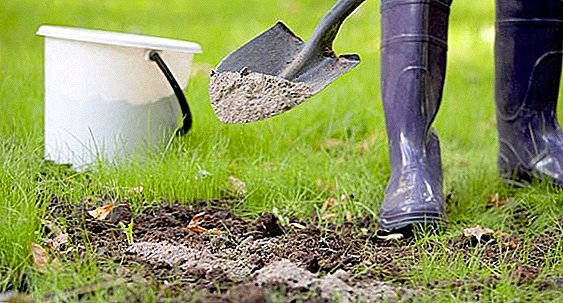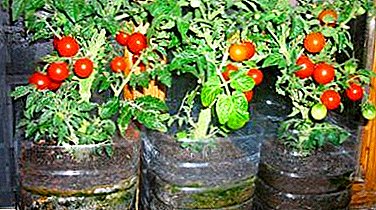 Fenugreek - one of the most famous seasonings in cooking. It is part of such famous blends as hops-suneli or curry. But, in addition, it is also a medicinal plant. Let's learn more about fenugreek and its uses.
Fenugreek - one of the most famous seasonings in cooking. It is part of such famous blends as hops-suneli or curry. But, in addition, it is also a medicinal plant. Let's learn more about fenugreek and its uses.
Brief description and places of growth
Fenugreek is an annual plant, refers to legumes. The plant itself is rather inconspicuous - low (up to 60 cm), the stem is even, sprigs with flat rounded leaflets depart from it.

Flowering occurs in May and lasts until the end of June. The flowers are small, inconspicuous, pale yellow color, eventually turning into long pods, bent into fancy shapes. The plant is quite unpretentious, grows on different soils and withstands large temperature differences.
Did you know? In different countries, fenugreek has different names. It is called Fenugreek, Greek hay, Shambhala, Chaman, camel grass.
There are two types:
- fenugreek (or Greek) - the most common form, different white flowers and extremely spicy taste;
- fenugreek blue it is often found in Georgia, in other places it is quite rare, it has blue flowers and a milder taste, similar to the mushroom one.


It grows almost everywhere in Eastern Europe and the Caucasus, in Asia, and is found in North Africa (Egypt and Ethiopia). Cultivated purposefully as a feed crop for livestock and for the manufacture of aromatic spices.
Other plants also have medicinal properties, such as lungwort, laconosa, savory, white silverweed, marsh wild rosemary, peppermint, anise, and cholstyanka.
Chemical composition
The main storage of vitamins in a plant is its seeds. There are a lot of mucus, bitterness, saponins, phytosterols, flavonoids, tannins, unsaturated and saturated fatty acids, and there are also vitamins A, C, group B.
In addition, it contains most of the essential minerals: potassium, calcium, magnesium, iron, phosphorus, sodium and zinc.

How useful fenugreek
Its widespread use is determined by the beneficial properties of the plant and the effect of its seeds on human health.
- Benefits for digestion, It has a beneficial effect on the digestive tract, normalizes metabolism. Seeds help normalize stools. Fenugreek grass is used to treat ulcers.
- It has anti-inflammatory action. Used to treat diseases of the respiratory tract, kidneys, liver, colds, flu, bronchitis and ARVI. Regenerating properties help to cure diseases and inflammations of the skin and oral cavity.
- Regulates and puts in order the exchange of fats.
- Lowers sugar. When fenugreek is taken for food, the splitting and absorption of sugar in the intestine slows down, which does not allow a sharp rise in its level in the blood. That is why it is worth adding such seeds to your diet for those who are sick with diabetes, or are at risk.

But besides the general benefits for the body, has fenugreek and benefit specifically for men and women.
For men
For men, Shambala benefits as a potentiality enhancer. The saponins in her seeds stimulate testosterone production and increase male libido. And in general, fenugreek is known as a good aphrodisiac. And taking such seeds with creatine, you will increase stamina and add yourself a large supply of strength and energy.
For the treatment of problems with men's health are used periwinkle, orchid, shepherd tea, nutmeg, dill, parsley, purslane, goldenrod, purple stonecrop, burning bush, avran medicinal, euphorbia, thyme.
For women
Take fenugrek useful future and young mothers. It will not only help strengthen the immunity of you and the baby, but also increase the production of milk. No wonder it is part of the special teas, which are produced specifically to increase lactation.

And its benefit is manifested in menopause and PMS - unpleasant manifestations are eliminated, the woman becomes calmer.
How to use in cooking
The main direction of use of fenugreek - as a culinary seasoning. Its specific aroma and taste are very much loved in the East. In India, it is added to curry, to various dishes (for example, dhal), in the Caucasus it is one of the components of basturma and hops-suneli mixtures, in Egypt it is eaten germinated, and they also make a drink called "gods tea".
Important! The maximum daily dose of fenugreek seeds in food is no more than 100 grams. Do not exceed this dosage.
Fenugreek leaves are added to food in small quantities. They give a bitterness and a pleasant smell to soups and salads.
Use in traditional medicine: recipes
And, of course, apply this plant in healers and herbalists for the treatment of various diseases.
To raise immunity
To prepare for the winter and possible epidemics of ARVI, or to alleviate the course of an already manifested disease, to stand up after a serious illness, You can follow this recipe:

- 2 tbsp. spoons of crushed seeds pour 500 ml of cold water and leave for three hours;
- then the broth is heated to 90-95 degrees, but not boiled;
- the liquid is poured into a thermos and take 50 ml 3-4 times a day.
Also, immunity is positively affected: safflower, horseradish, garlic, apples, ramson, black walnut, aloe, almonds, dogwood, Chinese magnolia, mint, basil, lemon balm.
For gargling with sore throat
Broth will help with sore throat and sore throat. To make it, a teaspoon of seed powder is poured with hot water (200 ml) and heated in a water bath for 15 minutes. After cooling, add boiling water, bringing the volume to 250 ml.

Rinse the procedure to repeat 3-4 times a day.
To enhance male potency
In solving such intimate problems one tablespoon of crushed shamballa seeds, taken once a day along with warm milk, will help.
For skin diseases
For skin problems, a fenugreek based ointment will help. It will also have a positive effect on dermatitis, eczema, furunculosis, fistula, purulent ulcers, wounds, and corns.

Spread 1-2 tbsp. spoon of fenugreek, water, bring to the consistency of ointment and put on low heat for 10 minutes, stirring constantly.
For the treatment of various skin diseases, including eczema, they use cornflower, ivy-shaped budru, celandine, longan, yucca, echinacea, fir, savory, black radish, chaffir
Apply the chilled ointment to the skin and wrap with a bandage. So repeat two or three times a day. In the absence of open wounds or dermatitis, you can simply smear the problem area and leave for a couple of hours. The treatment procedure lasts about 10 days.
For pain in the joints
If you have arthritis, or have other joint problems, prepare the following remedy. 10 g of crushed fenugreek beans pour 1/4 cup of water, and heated to 90 degrees, but not boiled. Add 1 teaspoon of vinegar and still warm applied to the sore spot. Cover with polyethylene and a soft cloth.

How can be used for cosmetic purposes
Perfectly serves Shambala for skin and hair care. Funds based on it will help you look irresistible. Here are some recipes for masks for skin and hair with fenugreek.
Did you know? The properties of fenugreek strengthened hair appreciated by Charlemagne himself. He was engaged in breeding this plant for use in the fight against baldness.
Face masks
And let's start with the most important thing - with the face.
Nutritional
To make it takeE 1 teaspoon chopped beans, add one egg yolk, 5 ml honey, 1 teaspoon cumin oil, 1 teaspoon olive oil.

The mixture is applied to the face and after a quarter of an hour it is washed off with cool water.
Cleansing
Preparation is simple: Mix 5-10 g of seeds with 20-30 g of olive oil. Apply on face for 10 minutes. This mask cleanses the skin and removes dermatitis, acne and other rashes.
As face masks they also use: prickly pear oil, honey, rose, fresh cucumbers, bee pollen, mountain ash red, gravilat, melon, curly lily, viburnum.
Moisturizing
Take one teaspoon of fenugreek, carrot juice, honey and aloe juice. Apply the mask for 20 minutes, then wash it off.
For hair
Benefit from this plant and the health of your hair. Masks based on it will help them to be healthier, will give a natural shine and beauty.

Dandruff
Two tablespoons of grains need to be cooked gruel. To do this, soak them overnight in water, then rub in a mortar, and rub the resulting porridge into the scalp. Leave for 1 hour, then wash your hair. Also, this tool can enhance hair growth.
To strengthen
Combine 1 teaspoon of ground seeds with the same amount of olive and cumin oil. If desired, add a little ground black pepper. Rub into the hair roots and wrap the head. Wash off after 30 minutes.
And if you eat fenugreek, the cosmetic effect will increase.

Contraindications and harm
Like any medicine, fenugreek can be not only useful. Sometimes its use can be harmful.
Important! Be sure to consult your doctor before taking fenugreek in any form, if you have diabetes or allergies.
Do not take it if you:

- are pregnant - The plant has a tonic effect, and can provoke premature labor;
- have thyroid problems - Fenugreek can disrupt the balance of hormones in the body.
To improve the activity of such an important hormonal center of the human body as the thyroid gland will help the use of watercress, zyuznik, onion-slizuna, irgi, feather grass, broccoli, white clover.
So, we met with such an interesting and useful plant as fenugreek. Will you make it from home cosmetics or traditional medicine, or going to add it to your culinary masterpieces - in any case, it will bring you only good with reasonable consumption.












